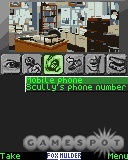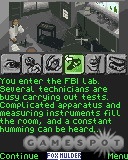The X-Files: The Deserter is a spooky, text-based adventure that's based on the now cancelled (but still popular) Fox television show starring FBI Agents Fox Mulder and Dana Scully. The game does offer some interesting gameplay angles, such as the ability to play as both Mulder and Scully, and its narrative and visual setting are effective enough to partially reconstruct the kind of mysterious atmosphere that the show seemed to generate effortlessly. Nevertheless, some of The X-Files: The Deserter's puzzles are more wearisome than they are thought-provoking, and a few are simply mind-bending non sequiturs. This means that the game proves to be more of a challenge than is typically expected or desired in a mobile game.
You start The X-Files: The Deserter filling the well-traveled shoes of conspiracy theorist Fox Mulder, who is jolted from his underachieving reverie when his superiors instruct him to head to Las Vegas to investigate a strange murder. You spend the bulk of your playing time guiding Mulder through several locations in southern Nevada and helping him to gradually unravel the sibylline plot. Furthermore, you have an opportunity to play as Dana Scully, who has stayed behind at FBI headquarters to use the scientific resources there that will aid Mulder in his investigation. Although the Scully sequence is exceedingly short, it provides a nice complement to Mulder's madcap desert chase.
The X-Files: The Deserter uses a simple interface to interact with in-game objects. The bottom of the screen holds your toolbar--with icons denoting the look, use, pick up, talk, travel, and inventory commands--as well as a text window. Above the toolbar is the first-person perspective of your location. All of the menus are limited to the number of actions you can actually perform in a location, so you generally won't have to bother examining game elements that aren't important to advancing the story, for instance. In addition, due to the quick navigation scheme, it's a fairly simple exercise to pick items up and then use them on objects in the environment. On the Sony Ericsson K700, for instance, it's possible to play the entire game using only the control stick.
Of course, a navigation system can only be as good as the narrative you progress through, and The X-Files: The Deserter runs into a number of bumps in this area. The entire game consists of about 15 different screens, so there's little chance of getting confused about where you're supposed to go. The problem seems to lie in some of the activities you'll undertake in these areas, which are on the erratic side. There are some puzzles that verge on the tedious, since you must take way too many steps to complete a straightforward activity. In other cases, it's unlikely you'll be able to figure out what to do without resorting to lengthy guess-and-check routines or reading a FAQ. In one particular case, you must use an item from your inventory on "darkness," which shows up as another item, to proceed; in another, you have to use the "talk to...about" function with some inventory items so that you can use them on another character, which represents a departure from the rest of the game's methodology. Adventure games must always balance a fine line between making their puzzles trifling yet solvable and interesting yet obscure. A majority of the riddles in The X-Files: The Deserter balances this fine line, but the gradient between the two still feels a little rough.
Visually, The X-Files: The Deserter represents a step up from most mobile adventure games. The various scenes are rendered in somber tones but are still very sharp and frequently contain some animation to boot. The dialogue and description generally reads quite well, although it suffers from an obvious unfamiliarity with American idiom. The game's audio is weak on the Sony Ericsson K700, containing only a chthonic jungle beat at the title screen. There's no The X-Files theme, strangely, and there are no sound effects whatsoever.
In all, The X-Files: The Deserter is a competent adventure game that will supply most gamers with several hours of play. The experience is tarnished, however, by a few highly nonintuitive puzzles that perhaps could have been addressed with more play testing. This game's formulation won't disappoint fans of the show, but it may eventually turn them off with its seemingly insuperable sticking points.

